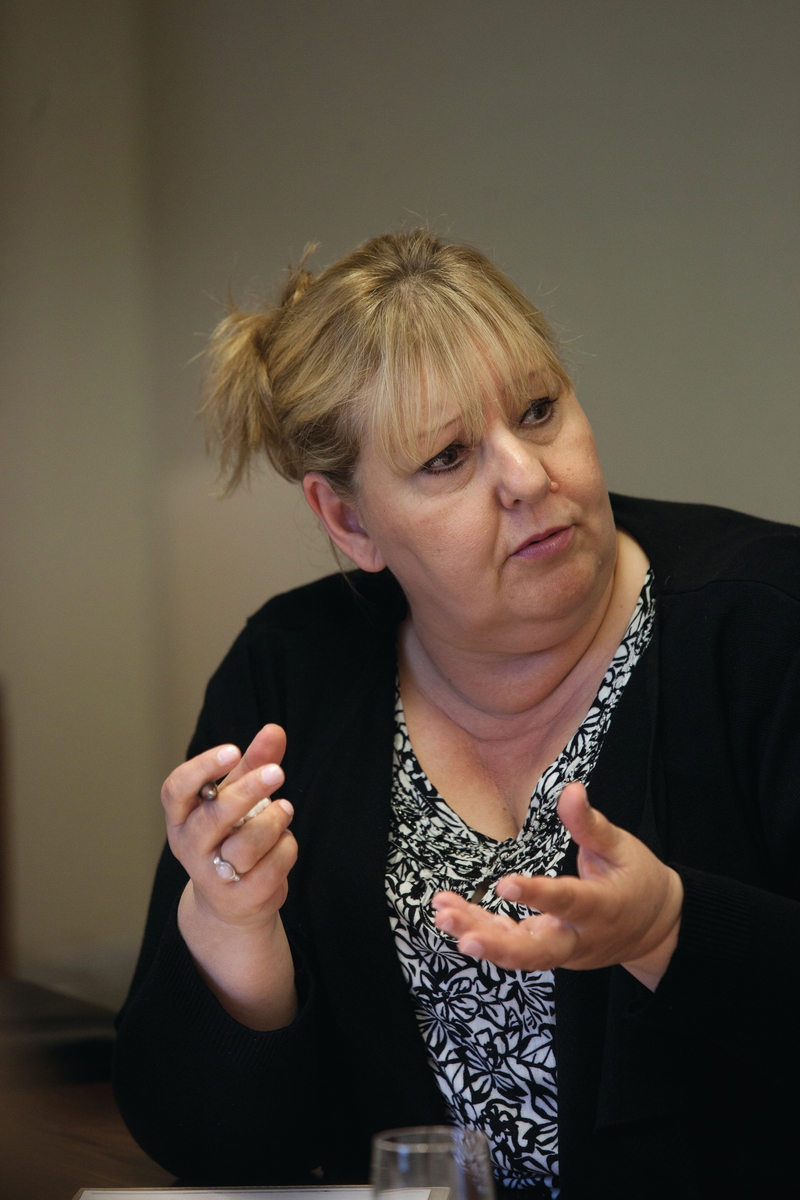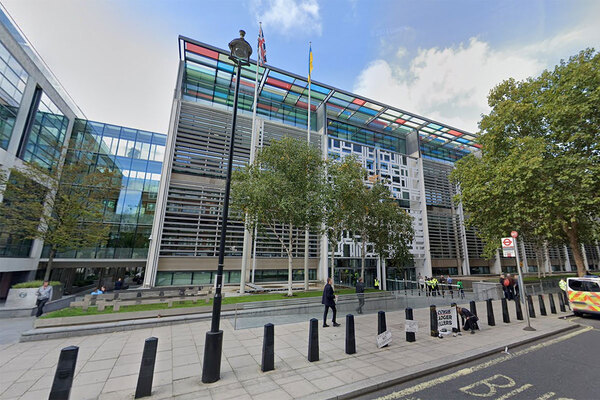You are viewing 1 of your 1 free articles
Battling behaviour
With housing providers being granted new powers to control anti-social behaviour, social landlords are weighing up their new duties. Inside Housing and Capsticks gather an expert panel to find out more. Kate Youde reports
Heads are nodding; murmurs of assent are rippling around the table. Chris Grose, head of anti-social behaviour advisory services with social housing law firm Capsticks, is talking about how creative social landlords are and, perhaps unsurprisingly in a room full of housing professionals, he is preaching to the converted.
It is their creativity, he tells the group gathered for Inside Housing’s round table debate on anti-social behaviour, in partnership with Capsticks, that housing providers need to draw on as they get to grips with new legislative tools for tackling ASB.
The government is taking a ‘hands-off’ approach to guidance around the Anti-Social Behaviour, Crime and Policing Act 2014, says Mr Grose. This, he argues, means the sector can be ‘quite open minded’ in how it uses the new powers. It is that approach, along with the opportunities and challenges the new law poses, which ASB professionals have assembled at the London Hilton on Park Lane to discuss.
New powers
The act, which received royal assent in March, updates and expands powers for local authorities and housing providers to deal with ASB through injunctions.

Aaron Devereaux, head of ASB, Sovereign Housing Association
Under the law, a court can issue an injunction against someone aged 10 or over if the person ‘has engaged or threatens to engage in anti-social behaviour’ and it considers it ‘just and convenient’ to grant the injunction to prevent the person engaging in ASB. As well as prohibiting the person from taking part in a specific activity, the injunction can also require the person to take action, for example entering a programme for substance abuse.
Yet even as our round table of experts gather to discuss the changes, there are still a lot of questions about how the new legislation will work in practice. So what are the challenges?
Housing professionals around the table are concerned, for example, that budget cutbacks in areas such as mental health and substance abuse may impact the new ability to require someone to take positive action. Sharon Nandoo, ASB manager at Southern Housing Group, says the 26,000-home association will consider first what services it can provide internally but that, inevitably, there will be positive requirements it will have to seek externally.
‘Many of us are working across several areas… so it will be [that] for each local authority area we will have to do our work to find out what’s available or what services we can access,’ she says.
Mr Grose, who worked with the Home Office to help shape the new act in his previous role as senior consultant for ASB and housing services at the Chartered Institute of Housing, acknowledges there will be ‘lots of focus on paid-for services’. But he also believes positive requirements represent an opportunity for the sector to use its creativity, in areas such as restorative justice, in which the perpetrators of a crime meet and talk to their victims with the aim of finding a way to make amends.
The round table members are unclear as to who will pay for any expenses associated with these positive requirements, but Janine Green, ASB practice and projects manager at the 300-member Social Landlords Crime and Nuisance Group, says some local authorities may invest money they receive to assist troubled families in positive requirements, which she believes bring a benefit because they make it a duty for someone to engage in programmes.

Sharon Nandoo, ASB manager, Southern Housing Group
‘So the positive requirement is always an opportunity to capture them, because once they are on it, you know you are going to see some success with that,’ she explains.
Brian Castle, assistant director for community services operations at the London borough of Richmond upon Thames, says the council sees a business case for going down that route. ‘If you don’t put some money into getting a care package, you’re going to have worse costs in the long term,’ he says. ‘If those children go off the rails, they are going to have children who go off the rails.’
Ruffling feathers
If the person fails to comply, the injunction requires that the police are informed. Some agencies, which work in a supporting environment with a client, will find the switch from support to supervision ‘deeply uncomfortable’, warns Aaron Devereaux, head of ASB at 36,000-home Sovereign Housing Association.
It is not the only part of the act likely to ruffle feathers: the legislation also gives courts the power to grant absolute grounds for possession for ASB in relation to secure tenancies of properties if the tenant commits a serious offence in, or in the locality of a property. But the tenant has a statutory right to review and a possible defence under article 8 of the European Convention on Human Rights. Rakhee Kotecha, legal services manager at 50,000-home Hyde Group, says she would be worried about using the tool because of challenges such as delays caused by article 8.

Alex Wrigley, operations manager for ASB, Guinness South
‘You want to have flexibility but I think careful consideration needs to be given as to whether or not you are going to go for possession on that mandatory ground and the practicalities around that,’ she adds.
The new law also includes a ‘community trigger’, a mechanism for victims of ASB to require a review of their case. The procedure for carrying out the review and the threshold - including the number of qualifying complaints received - will be decided locally by relevant bodies including the council, police and social housing providers.
The potential for differing approaches to the community trigger poses a headache for providers with stock in multiple areas. Sovereign, for example, ‘could get pulled in 54 different directions with 54 different trigger thresholds’, says Mr Devereaux. ‘Anecdotally… a lot of local authorities are saying, well, if it is a housing case we will probably hand it over to you to review so I’m thinking if this is heading our way anyway, we may as well use it as an opportunity to demonstrate to our customers that we are listening and we want to get this right,’ he adds.
However, Amanda Truscott, tenancy enforcement manager at 11,000-home Knightstone Housing Association, questions how such a review could be independent.
‘I would be very uncomfortable reviewing [a case] myself and saying, actually we did that great, and nobody independent looked at that,’ she says. ‘How credible is that going to be to the person who’s complaining?’
The housing professionals around the table agree that working with partners is key to making the new powers effective. In many cases, providers will have to improve existing relationships or form new ones. While an application for an injunction against an adult will be heard in the High Court or, more likely, the county court, a case against a respondent under the age of 18 will be heard in a youth court - new territory for housing associations. Providers also have a duty to consult about juveniles with youth offending teams, links with which might not currently exist.

Brian Castle, assistant director for community services operations, Richmond Council
For Alex Wrigley, operations manager for ASB at Guinness South, part of 60,000-home Guinness Partnership, it is problematic that housing providers are ‘big stakeholders’ in ASB in communities but not statutory partners in community safety partnerships, which bring together representatives from key local services to deal with issues like ASB. ‘What really should be a focus of the sector now is making sure we are getting a seat at that table because we are crucial to making sure that service is delivered on the ground,’ he says.
However Sue Robinson, head of housing services at 3,600-home Teign Housing, says that while there was no invitation in the past, the community safety partnership was now approaching her for a housing voice. After the meeting, she says: ‘It may well be that as chair of the Devon & Cornwall ASB Group I am able to represent, in terms of ASB, all of the landlords on the group - most of the ones in Devon and Cornwall - which makes life a lot easier for the agencies concerned rather than having to make contact or engage with multiple landlords.
‘This led me to thinking that it might be worth other landlords getting together in a similar way to offer one point of contact to other agencies.’
For Jan Fox, senior tenancy enforcement officer at 9,000-home Wales & West Housing, the issue of partnership working begins at the allocations stage. She says, increasingly, providers are being asked to house vulnerable people with high support needs and, due to nominations from common waiting lists, ‘voids are just being filled with people, they [landlords] are not matching people to properties’.
Learning to share
Hand in hand with this need for partnership working is that for sharing information. Sharon Marsh, community safety manager at South Liverpool Homes, says there is sometimes a ‘fear’ about sharing information yet it is key to partnership working.

Sharon Marsh, community safety manager, South Liverpool Homes
‘OK, you’ve got to have the right people around the table, but the right people who know the information that they can share so we can use that information,’ she says.
Ms Marsh adds that while there is understanding at strategic level (the 3,600-home association is working with the police and crime commissioner) and in neighbourhoods, where the association has trained police community support officers, there is a ‘barrier in the middle’. For example, her organisation struggles to get community impact statements from the police.
Inspector Nick Fallowfield, the Metropolitan Police’s lead on neighbourhood policing, is concerned with ensuring there is an ‘effective presence’ for all high-risk ASB cases, so cases such as that of Fiona Pilkington are not repeated. In 2007, Ms Pilkington, who had made 33 complaints to Leicestershire police about harassment, killed herself and her disabled daughter, Francecca Hardwick. The Independent Police Complaints Commission found the force had failed to provide ‘a cohesive and effective approach to the anti-social behaviour the family suffered’.
Organisations must keep sharing information despite budget reductions, says Inspector Fallowfield, who is responsible for training around the new act within the Metropolitan Police and working with the Royal College of Policing on how officers respond nationally to ensure consistency.
He says there are monthly meetings, called multi-agency risk assessment conferences, to manage high-risk cases - yet Ms Nandoo says Southern is sometimes not invited to meetings involving its own tenants.

Amanda Truscott, tenancy enforcement manager, Knightstone Housing Association
Inspector Fallowfield admits the Metropolitan Police must improve the quality of its performance in recording ASB reports. Despite a new tool, he claims only ‘quite a low percentage’ of ASB relayed calls actually get put into the system so ‘even within the Met we are missing a lot of information, let alone truly sharing all that information’.
Making progress
Mr Grose believes things have come a long way since the Pilkington case, but says it is still necessary to change the culture around ASB.
‘The risks of not sharing information are usually far greater than sharing information,’ he says.
And as for the recurring question of who is going to foot the bill for injunctions and positive requirements, the answer may lie in part, he suggests, within the act itself, which allows for breaches of community protection notices to be dealt with via income-generating fixed penalty notices. The police or a local authority - or a registered provider if the council delegates authority - can, following a written warning, issue a CPN to someone over the age of 16, or an organisation, if their conduct is ‘unreasonable’ and has a ‘detrimental effect, of a persistent or continuing nature’ on the quality of life of those nearby. CPN fines can be up to £2,500.
Whoever pays, providers agree they need to build good relationships with partners to bring effective cases. Once they get to court, however, they face delays caused by cuts to the judiciary. Mike Owen, partner at Capsticks, has a solution: a specialised housing court. He is not confident it will happen though, as ‘it’s been whispered [about] for years’.
Nevertheless, the idea has the backing of the room. Lynsey Richardson, in-house solicitor at Viridian Housing, says the 16,000-home landlord waited two months for a hearing date at Croydon County Court for a serious racial incident.
‘With all these new things coming in, it’s going to be more time delay,’ she predicts.
To get its own court, the sector as a whole will need to build bridges. With good relationships with the Home Office and the Communities and Local Government department under its belt, it had better ‘start running on’ the Ministry of Justice, suggests Mr Grose. No doubt using its creativity.


















